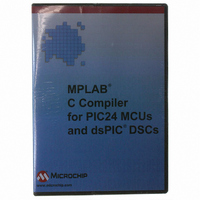SW006012 Microchip Technology, SW006012 Datasheet - Page 28

SW006012
Manufacturer Part Number
SW006012
Description
C COMPILER FOR DSPIC30F FAMILY
Manufacturer
Microchip Technology
Type
MPLAB® C30 Compilerr
Series
PIC24 & DsPICr
Specifications of SW006012
Supported Families
PIC24, DsPIC30F And DsPIC33F
Core Architecture
PIC, DsPIC
Kit Contents
Software And Docs
Mcu Supported Families
PIC24 MCUs And DsPIC DSCs
Tool Type
Compiler
Processor Series
PIC24, dsPIC
Lead Free Status / RoHS Status
Not applicable / Not applicable
For Use With/related Products
dsPIC30F
Lead Free Status / Rohs Status
Lead free / RoHS Compliant
- Current page: 28 of 248
- Download datasheet (3Mb)
MPLAB
DS51284F-page 22
®
C30 User’s Guide
Auto Variables
Automatic variables (variables defined within a function) are subject to different rules
than file scope variables. Automatic variables are owned by the enclosing function and
do not need the boot or secure attribute. They may be assigned initial values, as
shown:
void __attribute__((boot)) chuck_cookies()
{
}
Note that the initial value of where is based on a string literal which is allocated in the
PSV constant section .boot_const. The compiler will set PSVPAG to the correct
value upon entrance to the function. If necessary, the compiler will also restore
PSVPAG after the call to splat().
const
Many functions do not examine any values except their arguments, and have no effects
except the return value. Such a function can be subject to common subexpression
elimination and loop optimization just as an arithmetic operator would be. These
functions should be declared with the attribute const. For example:
int square (int)
says that the hypothetical function square is safe to call fewer times than the program
says.
Note that a function that has pointer arguments and examines the data pointed to must
not be declared const. Likewise, a function that calls a non-const function usually
must not be const. It does not make sense for a const function to have a void return
type.
deprecated
See Section 2.3.1 “Specifying Attributes of Variables” for information on the
deprecated attribute.
far
The far attribute tells the compiler that the function should not be called using a more
efficient form of the call instruction.
format (archetype, string-index, first-to-check)
The format attribute specifies that a function takes printf, scanf or strftime
style arguments which should be type-checked against a format string. For example,
consider the declaration:
extern int
my_printf (void *my_object, const char *my_format, ...)
This causes the compiler to check the arguments in calls to my_printf for
consistency with the printf style format string argument my_format.
The parameter archetype determines how the format string is interpreted, and should
be one of printf, scanf or strftime. The parameter string-index specifies
which argument is the format string argument (arguments are numbered from the left,
starting from 1), while first-to-check is the number of the first argument to check
int hurl;
int them = 55;
char *where = "far";
splat(where);
/* ... */
__
attribute
__
__
attribute
((format (printf, 2, 3)));
__
((const int));
© 2007 Microchip Technology Inc.
Related parts for SW006012
Image
Part Number
Description
Manufacturer
Datasheet
Request
R

Part Number:
Description:
Manufacturer:
Microchip Technology Inc.
Datasheet:

Part Number:
Description:
Manufacturer:
Microchip Technology Inc.
Datasheet:

Part Number:
Description:
Manufacturer:
Microchip Technology Inc.
Datasheet:

Part Number:
Description:
Manufacturer:
Microchip Technology Inc.
Datasheet:

Part Number:
Description:
Manufacturer:
Microchip Technology Inc.
Datasheet:

Part Number:
Description:
Manufacturer:
Microchip Technology Inc.
Datasheet:

Part Number:
Description:
Manufacturer:
Microchip Technology Inc.
Datasheet:

Part Number:
Description:
Manufacturer:
Microchip Technology Inc.
Datasheet:










